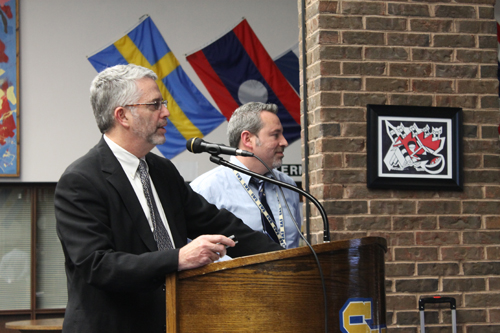SWR 2013-14 school budget to preserve school programs

By making one-time cuts and reducing professional services in their 2013-14 school budget, the Shoreham-Wading River school district will be able to stay within the state tax levy cap without having to cut school programs, according to a preliminary school budget.
But district officials warned that eventually there will be no more areas left to cut and administrators may have to make the “hard decisions” as early as next year about which school programs will go.
“The 2 percent tax levy cap is forcing districts all over New York State to think about what the important elements of their program are,” said superintendent Steve Cohen during a presentation at Tuesday night’s school board meeting.
The nearly $66 million 2013-14 school year budget forecasted in Mr. Cohen’s presentation is a roughly 5.3 percent increase from this year’s budget. The tax levy — the total amount of money collected from residents — will rise 1.9 percent, keeping it within the state’s limit.
But Mr. Cohen said that the budget is higher mostly because of hikes in the state-regulated pension contribution rates.
The district’s contribution to the teacher retirement system jumped 38 percent from last year, while employee retirement contributions rose about 13 percent from 2012-13, according to the presentation. Health insurance costs are also expected to rise by at least 15 percent, Mr. Cohen said.
Mr. Cohen said the district administration’s budget forecast would preserve district programs by making decisions to reduce $1,650,000 in costs that don’t affect student’s education in the budget.
One example was removing the overlap in federal grant money, Mr. Cohen said. In previous years, the district has budgeted in money that the federal government had promised them in grant funding in case the grant money is not delivered.
Now the district will not budget in the overlap in funding, which reduces flexibility in the budget if the grant funds are less than projected, he said. Once those one-time cuts are made, the next budget would be set at that new lower baseline.
Some programs will be improved in the new budget. Athletic teams will no longer use the district’s mini-buses to get to athletic events; the district will sign a contract with an outside company to hire newer buses with better safety measures to transport the teams, officials said.
Board member John Zukowski said the board must make sure they are getting all the necessary taxes from new construction projects like the proposed J-Power natural gas power plant in Shoreham.
But even if the district is getting the right amount of taxes, the board will still have to choose whether to cut programs or pierce the tax cap within the next few years, board president Bill McGrath said.
“Eventually we’ll either run out of money or the philosophy will be if we want to maintain this educational program that works to the benefit of our kids, then we’re actually going to have to start having a discussion about how do we go about piercing the cap,” Mr. McGrath said.
And the longer the district waits to pierce the cap, the higher the tax levy will jump and the harder it will be to pass a budget, officials said. If programs aren’t cut, the tax levy could rise to about 10 percent or higher as expenses increase and the district’s fund balance and state aid dry up in the coming years.
“We’re building the hill before the cliff,” Mr. McGrath said.








